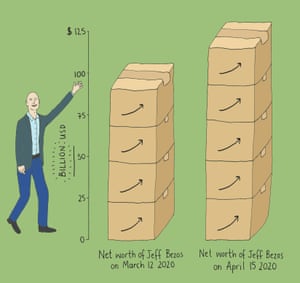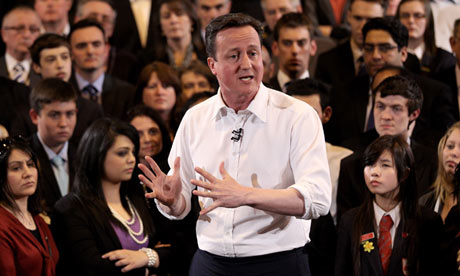
Jeff Bezos has seen his wealth increase from $105bn to $130bn. Photograph: Mona Chalabi
Never let a good crisis go to waste: as the coronavirus pandemic sweeps the world, America’s 1% have taken profitable advantage of the old saying.
Some of the richest people in the US have been at the front of the queue as the government has handed out trillions of dollars to prop up an economy it shuttered amid the coronavirus pandemic. At the same time, the billionaire class has added $308bn to its wealth in four weeks - even as a record 26 million people lost their jobs.
According to a new report from the Institute for Policy Studies, a progressive thinktank, between 18 March and 22 April the wealth of America’s plutocrats grew 10.5%. After the last recession, it took over two years for total billionaire wealth to get back to the levels they enjoyed in 2007.
Eight of those billionaires have seen their net worth surge by over $1bn each, including the Amazon boss, Jeff Bezos, and his ex-wife MacKenzie Bezos; Eric Yuan, founder of Zoom; the former Microsoft chief Steve Ballmer; and Elon Musk, the Tesla and SpaceX technocrat.
The billionaire bonanza comes as a flotilla of big businesses, millionaires and billionaires sail through loopholes in a $349bn bailout meant to save hard-hit small businesses. About 150 public companies managed to bag more than $600m in forgivable loans before the funds ran out. Among them was Shake Shack, a company with 6,000 employees valued at $2bn. It has since given the cash back but others have not.
Fisher Island, a members-only location off the coast of Miami where the average income of residents is $2.2m and the beaches are made from imported Bahamian sand, has received $2m in aid.
Its residents seemed to be doing fine even before the bailout. This month, the island purchased thousands of rapid Covid-19 blood test kits for all residents and workers. The rest of Florida is struggling. About 1% of Florida’s population has been tested for the coronavirus, behind the national figure of 4%. The state is also in the midst of an unemployment claims crisis, with its underfunded benefits system unable to cope with the volume of people filing.
The banks that were the largest recipients of bailout cash in the last recession have also done well, raking in $10bn in fees from the government loans, according to an analysis by National Public Radio.
“Heads we win, tails you lose,” said Chuck Collins, director of the program on inequality and the common good at the Institute for Policy Studies and co-author of the new report.
Collins said the pandemic had further exposed fault lines in the US body politic that have been widening the gap between the really rich and the rest over decades.
“The rules of the economy have been tipped in favor of asset owners against everyone else,” said Collins.
By 2016 – seven years after the end of the last recession – the bottom 90% of households in the US had still not recovered from the last downturn while the top 10% had more wealth than they had in 2007.
Throughout the recovery, stock market gains disproportionately favored the wealthy. The top 1% of households own nearly 38% of all stock, according to research by the New York University economist Edward Wolff. Even before the coronavirus hit, homeownership in the US – a traditional source of wealth growth – was well below its 2004 peak.
Nor did Americans earn more. Wage growth remained sluggish during the decade-long record-breaking growth in the jobs market that came after the last recession.
For black and Latin Americans, the situation is worse. The black-white wage gaps are larger today than they were in 1979.
Meanwhile, billionaires have been unable to put a well-heeled foot wrong. Billionaire wealth soared 1,130% in 2020 dollars between 1990 and 2020, according to the Institute for Policy Studies. That increase is more than 200 times greater than the 5.37% growth of median wealth in the US over this same period. And the tax obligations of America’s billionaires, measured as a percentage of their wealth, decreased 79% between 1980 and 2018.
So when the pandemic struck, those at the apex of the wealth pyramid were better positioned than ever to take advantage of the chaos. The rest, not so much.
Collins has been studying income inequality for 25 years and has seen the really rich win victory after victory. But even he was surprised by how quickly America’s billionaires have turned pandemic into profit. “I still get shocked,” he said.
Never let a good crisis go to waste: as the coronavirus pandemic sweeps the world, America’s 1% have taken profitable advantage of the old saying.
Some of the richest people in the US have been at the front of the queue as the government has handed out trillions of dollars to prop up an economy it shuttered amid the coronavirus pandemic. At the same time, the billionaire class has added $308bn to its wealth in four weeks - even as a record 26 million people lost their jobs.
According to a new report from the Institute for Policy Studies, a progressive thinktank, between 18 March and 22 April the wealth of America’s plutocrats grew 10.5%. After the last recession, it took over two years for total billionaire wealth to get back to the levels they enjoyed in 2007.
Eight of those billionaires have seen their net worth surge by over $1bn each, including the Amazon boss, Jeff Bezos, and his ex-wife MacKenzie Bezos; Eric Yuan, founder of Zoom; the former Microsoft chief Steve Ballmer; and Elon Musk, the Tesla and SpaceX technocrat.
The billionaire bonanza comes as a flotilla of big businesses, millionaires and billionaires sail through loopholes in a $349bn bailout meant to save hard-hit small businesses. About 150 public companies managed to bag more than $600m in forgivable loans before the funds ran out. Among them was Shake Shack, a company with 6,000 employees valued at $2bn. It has since given the cash back but others have not.
Fisher Island, a members-only location off the coast of Miami where the average income of residents is $2.2m and the beaches are made from imported Bahamian sand, has received $2m in aid.
Its residents seemed to be doing fine even before the bailout. This month, the island purchased thousands of rapid Covid-19 blood test kits for all residents and workers. The rest of Florida is struggling. About 1% of Florida’s population has been tested for the coronavirus, behind the national figure of 4%. The state is also in the midst of an unemployment claims crisis, with its underfunded benefits system unable to cope with the volume of people filing.
The banks that were the largest recipients of bailout cash in the last recession have also done well, raking in $10bn in fees from the government loans, according to an analysis by National Public Radio.
“Heads we win, tails you lose,” said Chuck Collins, director of the program on inequality and the common good at the Institute for Policy Studies and co-author of the new report.
Collins said the pandemic had further exposed fault lines in the US body politic that have been widening the gap between the really rich and the rest over decades.
“The rules of the economy have been tipped in favor of asset owners against everyone else,” said Collins.
By 2016 – seven years after the end of the last recession – the bottom 90% of households in the US had still not recovered from the last downturn while the top 10% had more wealth than they had in 2007.
Throughout the recovery, stock market gains disproportionately favored the wealthy. The top 1% of households own nearly 38% of all stock, according to research by the New York University economist Edward Wolff. Even before the coronavirus hit, homeownership in the US – a traditional source of wealth growth – was well below its 2004 peak.
Nor did Americans earn more. Wage growth remained sluggish during the decade-long record-breaking growth in the jobs market that came after the last recession.
For black and Latin Americans, the situation is worse. The black-white wage gaps are larger today than they were in 1979.
Meanwhile, billionaires have been unable to put a well-heeled foot wrong. Billionaire wealth soared 1,130% in 2020 dollars between 1990 and 2020, according to the Institute for Policy Studies. That increase is more than 200 times greater than the 5.37% growth of median wealth in the US over this same period. And the tax obligations of America’s billionaires, measured as a percentage of their wealth, decreased 79% between 1980 and 2018.
So when the pandemic struck, those at the apex of the wealth pyramid were better positioned than ever to take advantage of the chaos. The rest, not so much.
Collins has been studying income inequality for 25 years and has seen the really rich win victory after victory. But even he was surprised by how quickly America’s billionaires have turned pandemic into profit. “I still get shocked,” he said.




